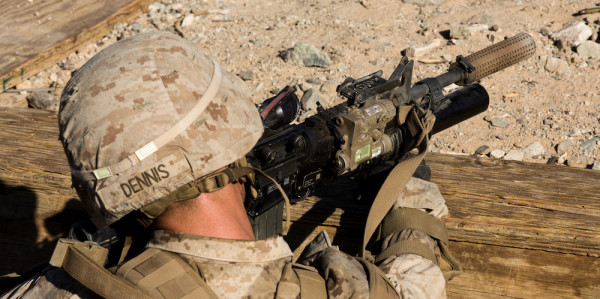

The members of Bravo Company, 1st Battalion, 2nd Marines, currently deployed in Norway, are officially the first Marine Corps infantry to deploy with suppressors on every service member’s weapons, Military.com reports.
The news comes just about six months after Maj. Gen. John Love, the commanding general of 2nd Marine Division, announced plans for several “experiments” in silencing every weapon in an infantry battalion’s arsenal, from M2 .50-caliber machine guns to the standard-issue M4 service rifle, beginning with a pre-deployment training exercise by three rifle companies last October.
The logic of employing suppressors is simple: With infantry units usually tightly packed on the battlefield, dulling the cacophony of automatic weapons fire and allowing increased verbal communication is a small shift that could fundamentally change the way Marine units operate, according to Love.
“It used to be a squad would be dispersed out over maybe 100 yards, so the squad leader couldn’t really communicate with the members at the far end because of all the noise of the weapons,” he said in November. “Now they can actually just communicate, and be able to command and control, and effectively direct those fires.”

U.S. Marines with Bravo Company, 1st Battalion, 2nd Marine Regiment utilize suppressors while conducting company attacks on range 400 in Twentynine Palms, Calif., Oct. 23, 2016. The Marines of B. Co are the first in the Marines Corps to use the suppressors, demonstrating the capabilities on platoon and company attack ranges during Integrated Training Exercise (ITX) 1-17, in preparation for a Special Purpose Marine Air-Ground Task Force deployment. (U.S. Marine Corps photo by Sarah N. Petrock, 2d MARDIV Combat Camera)Photo via DoD
The Marines appear very pleased with this experiment. Reporting from the Vaernes Garrison near Trondheim, Norway, Hope Hedge Seck writes that after three months of training and live fire exercises armed with silenced weapons, members of Bravo Company “never want to go back”:
“It took us back to remembering what it was like not to be suppressed, when you see people trying to communicate,” [Bravo Company commanding officer Capt. Jack] Edgar said. “For guys in charge of other Marines, being able to talk is a big way that we fight. The suppressed weapons have helped that a lot.”
For Staff Sgt. Troy Hauck, a platoon sergeant with Bravo Company’s Weapons Platoon, not having to worry about ear protection when firing his rifle is a nice bonus. But a potentially bigger boon is the element of surprise that comes with a suppressed weapon.
“Just doing some of the training attacks that we’ve done on this deployment has been good,” he said. “I’m on one side of the hill and on the other side of the hill, and I can’t hear them firing their weapons. It’s pretty nice, real stealthy.”
Suppressors don’t just offer a tactical advantage on the noisy battlefield, but a medical one as well. As Popular Mechanics noted after Love’s initial announcement in November, weapons like the M4 and M240 machine gun produce noise well above what the federal government considers a healthy ceiling of 150 decibels — prolonged exposure to which can yield significant hearing loss.
Of course, suppressors don’t totally drown out the racket of gunfire (one of the many reasons they’re less often referred to as “silencers” nowadays), but they’re efficient enough to drop the noise of the M4 carbine by more than 30 decibels, right above the drone of a commercial jackhammer, according to PopMech.
It’s unclear if and when this experiment will extend to other battalions. Chief Warrant Officer 5 Christian Wade, the 2nd Marine Division gunner, told Military.com in November that equipping an entire infantry battalion of 800 troops will run the Marine Corps around $700,000. That’s a relatively small price to pay for better communication and the element of surprise — and to avoid going deaf like poor Nelson in “Black Hawk Down”:
